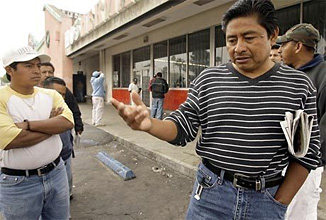 |
 |
 |
 Editorials | Issues | May 2007 Editorials | Issues | May 2007  
Millions Could Emerge, but Trust May Take Time
 Associated Press Associated Press


| | Day laborer Tomas Lopez, right, from Guatemala, expresses optimism Friday about the tentative immigration-reform proposal outside a Home Depot in Los Angeles. (Damian Dovarganes/AP) |
Immigration lawyers say it is too early to know how many illegal immigrants will accept the Senate's offer to seek citizenship, but the prospect of coming out of the shadows holds strong appeal.

The federal government offered an amnesty program in 1986 to illegal immigrants who had been in the United States at least four years. An estimated 2.7 million people took advantage of it.

"We've been through this once before in 1986, and everyone came forward — even people who didn't qualify," said Carl Shusterman, a Los Angeles immigration attorney. "This is a great benefit, and everyone will be trying to take advantage of it."

The Senate's proposal would allow illegal immigrants who arrived before Jan. 1, 2007, to remain in the United States on probationary status and renew four-year visas. They eventually could obtain a green card, which could take at least eight years. Heads of households would have to return to their home countries first.

Dan Kowalski, editor of Bender's Immigration Bulletin, said many immigrants likely will wait to see how friends, relatives and neighbors fare.

"In 1986, it happened in rolling waves," he said. "Not everyone applied all at once. It took time for people to gain confidence in the process. I think the same thing will happen here."

If the proposed legislation survives with tougher border enforcement and a crackdown on employers, illegal immigrants may have less choice than in 1986, Kowalski said.

"Staying underground will be less of an option if you're subject to losing your job or not being able to get a new job," he said. "Participation may be higher regardless of how much trust there is."

Immigration lawyers said a key unknown is whether the agency handling visa applications promises not to share information with deportation officers. Such a promise was made in 1986.

"No one is going to come forward if they think it may lead to deportation," said Mary Meg McCarthy, a lawyer at the National Immigrant Justice Center in Chicago.

Immigration advocates also warn against unscrupulous attorneys and public notaries making false promises of citizenship.

"Anytime there's an announcement like this, notaries tell people to come in and pay, and we'll take care of you," said Donald Kerwin, executive director of the Catholic Legal Immigration Network. "It's already happening."

Genaro Vicente, 35, a Guatemalan in the United States for six years, said it was unfair to make workers return to their home countries.

"When we're already here, why?" he asked Friday while standing near a Home Depot in Los Angeles. "I don't trust the politicians to let us back in." | 
 | |
 |



